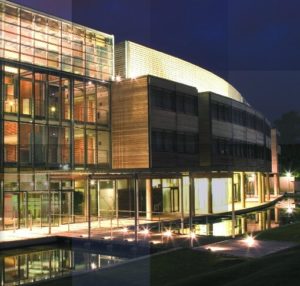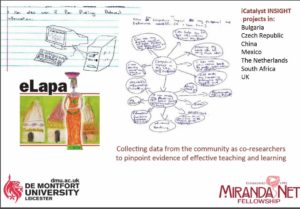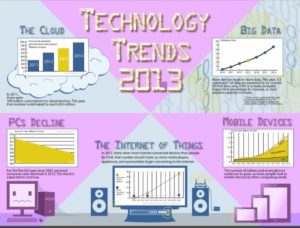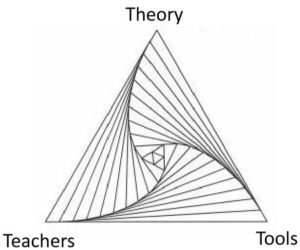The value of research and development in promoting education innovation and pupil achievement
A joint Naace and MirandaNet seminar about the iCatalyst CPD programme
National College of Teaching and Leadership, Nottingham, November 6th 2015
◄►
 Research by MirandaNet shows that, in the UK, Continuing Professional Development(CPD) in Technology Enhanced Learning is increasingly fragmented. The challenge is also for teachers, trainers and advisers who lead CPD, in school or from outside, to keep their own training relevant. These leaders of CPD do not themselves have enough opportunities for high level training in pedagogical opportunities, systemic change management and importantly, research and the use of real data gathered in schools. Overall, this was the general outcome of the day, namely that more thinking need about how to maximise ongoing investment of time and resource in schools. iCatalyst aims to provide a solution because the programme can fit into the school development plan and can be done in classrooms. Naace is a partner in delivering iCatalyst and as part of this Naace/MirandaNet event four Naace company representatives sat on an invited panel to talk about the value of research in improving their service to teachers.
Research by MirandaNet shows that, in the UK, Continuing Professional Development(CPD) in Technology Enhanced Learning is increasingly fragmented. The challenge is also for teachers, trainers and advisers who lead CPD, in school or from outside, to keep their own training relevant. These leaders of CPD do not themselves have enough opportunities for high level training in pedagogical opportunities, systemic change management and importantly, research and the use of real data gathered in schools. Overall, this was the general outcome of the day, namely that more thinking need about how to maximise ongoing investment of time and resource in schools. iCatalyst aims to provide a solution because the programme can fit into the school development plan and can be done in classrooms. Naace is a partner in delivering iCatalyst and as part of this Naace/MirandaNet event four Naace company representatives sat on an invited panel to talk about the value of research in improving their service to teachers.
In iCatalyst all the stake holders use action research techniques to share evidence of what works and what does not. The data is collected in school as part of a ‘normal’ working day so that the research does not increase a teacher’s workload. Naace and MirandaNet members, company representatives and practitioners who elect to take part in iCatalyst can work at Certificate, Diploma or Masters level to build knowledge about digital technologies in classrooms and findings can be published in a variety of forms. iCatalyst is directed by Professor Christina Preston and Dr Sarah Younie at the new Education Futures Centre, De Montfort University.
MirandaNet is pleased to hear from educators, schools and companies who would like to be involved in iCatalyst to work as a co-researcher or as a mentor: Please contact Professor Preston by email christina@mirandanet.ac.uk or use the online contact form: /contact-us
Presentations and discussions.
iCatalyst: Sprint and Insight research programmes for teachers, researchers and developers.
Dr Sarah Younie, De Montfort and Dominic Preston, MirandaNet
- Slides: iCatalyst, Sprint and Insight programmes
- Slides: Delegate pack
In this presentation the scope of the MirandaNet iCatalyst action research programme was explained:
Sprint is typically a one term audit by teachers, researchers and developers of pupils’ achievements using Technology Enhanced Learning (TEL).
Insight is a change management programme in which school leaders and teachers work as co-researchers with mentors and developers to establish effective methods of using TEL to improve pupil achievement. The evidence is reported in a form that can be used by the school for their own marketing and for submissions to funding bodies, Pupil Premium and OFSTED.
The Landscape of ICT CPD and the Golden Triangle
Professor Christina Preston, De Montfort and MirandaNet and Allison Allen, Outstream
Allison Allen (Director of Outstream Consulting, Naace Trustee and Senior MirandaNet Fellow) and Christina Preston presented a series of slides presenting the thinking that underpinned the seminar. A key contention is that Technology Enhanced Learning (TEL) can be improved through better research and better teaching if teachers, suppliers/developers and researchers maintain a flow of communication (Rose Luckin’s Golden triangle). The attached slides include a review of the ICT CPD Landscape, A Becta report  co-authored by Christina and Allison. This was a landmark study that reported on ICT CPD programmes available to teachers in England in 2010 and focused on in-school interviews, questionnaires and focus groups.
co-authored by Christina and Allison. This was a landmark study that reported on ICT CPD programmes available to teachers in England in 2010 and focused on in-school interviews, questionnaires and focus groups.
In this presentation Allison compared the findings of that report with the changing scene in schools 5 years on and the current focus on technicist training. Allison also shared research that shows adding education technology to potential learning solutions has been found to be most effective if applied within a system known as the closed loop. You can read more about the ideas that underpin the seminar in Christina’s blog here.
Significant themes in the study of learning – and their echoes in learning technology
Charles Crook Nottingham University
- Slides:Significant themes in the study of learning

- With talking head (Flash version): http://jcal.info/miranda/naace15/
- With talking head (Non-Flash): http://jcal.info/miranda/naace15/html5.html
Professor Charles Crook has made a video of his talk about theories of learning that are particularly relevant to our work as innovators in education. He claims that all practitioners have theories about learning even if they do not know the academic terms. This stimulating talk about learning science is also about research methods that teachers as co-researchers can use to collect evidence of learning.
Panel Session
Louise Raw, Show My Homework, observed: “Research not only provides us with invaluable insight into our product and users, but it’s also our duty to ensure that we’re adding value within the education industry. Without research, we are relying on gut feelings and assumptions. As essential as they are for qualities of innovators to stay ahead of the curve, research allows us to validate these assumptions with real data, adjust our path along the way, and confidently move forward at a much quicker speed. The research carried out with MirandaNet, most notably the critical incidents notified during the various focus groups, confirmed our decisions around the next areas of focus for Show My Homework, continuing to provide a world-class service and experience for our award-winning, cloud based homework software.
Trevor Hensley, Group Call commented: The value of research to Groupcall is multi-faceted and is something we use regularly in many areas of our business including customer retention and customer feed-back which impacts on product development and general research into trends and practises in the education market place we work in. Customer feed-back is used both before and after release of products so that we can initially make sure they are fit for purpose and then of course to make sure they achieve their objectives. We use a number of different methodologies for research including voice communications, social media and electronic communications to try and reach as wide an audience as possible. We have recently added a customer retention team to our staff profile and their primary role is to contact existing customers on a daily basis to see how their existing products are working, what training needs they have and to see what their needs might be for technology in the future. We also use this service to identify how our technologies impact on the day to day functioning of the schools that use our products. Overall research forms an intrinsic part of our business activities and is something that we carry out regularly. The key lesson from the research that we have done with the MirandaNet Fellowship was our realisation that some hesitant parents were being drawn into their children’s educational progress because of the information they were receiving from Groupcall on their smartphones.
Andrea Carr, Rising Stars explained that until recently they had conducted their own research that had given them valuable insights into the value of their products. The company now wants to increase their insights by working with teachers as co-researchers mentored by MirandaNet.
Roger Broadie talked about his work for Fujitsu where they are studying the approaches schools are taking to capture evidence of pupils’ progress. The project is a balance between an educational study that will produce general conclusions that are of relevance to all schools, and an investigation of aspects of the collection of evidence of progress specifc to the imaging products that Fujitsu sells. These are being linked and brought together by creating several different kinds of outputs from the research materials. There will be a white paper that will look at the capturing of evidence of progress ‘in the round’, drawing on examples of approaches, the views of several schools and considerations from education research generally. There will be at least two video case-studies based on interviews with teachers in schools to present what they do and their insights into its importance. These video case-studies will then inform further case-studies that look specifically at the use of Fujitsu products to capture evidence of progress. All these outputs will be related to the insights being gained through the Naace Third Millennium Learning Award bcasue the schools we are working with in this project have all gained this Award and are specifically using the use of evidence of progress as a key tool to raise their pupils’ engagement in learning.
◄►
